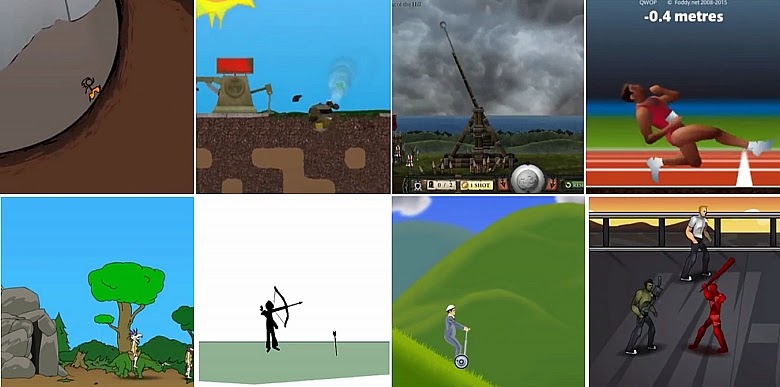
For many developers, they made their way into the gaming industry, and also served as a springboard for experiments in search of bright and exciting ideas. The end of support for Flash in December 2020 marks the end of one of the most creative periods in gaming history.
From the translator : We remembered about Flash by accident when we studied the dynamics of web development and games events registered on our site.


In general, it is intended for our internal use, but from the curious, we noticed that, despite the pandemic, the number of events is growing noticeably. It can also be seen here that the organizers of web development events began to use our site only in 2018, while gamers showed activity a couple of years earlier. At the intersection of these themes are the flash games, which in the early 2000s often encroached on our working hours (yes, there was a sin). Well, a short googling of this topic led us to the idea of publishing this nostalgic translation.
It all started in 1996 when the first Flash player was released. It was originally intended for web graphics and animation, but when it got its own programming language in 2000, developers started using it to create games.
That same year, there was a surge in popularity for the first flash game website, Newgrounds . Any developer could upload their games to it, and they immediately fell into the catalog.
The progenitor of endless runners
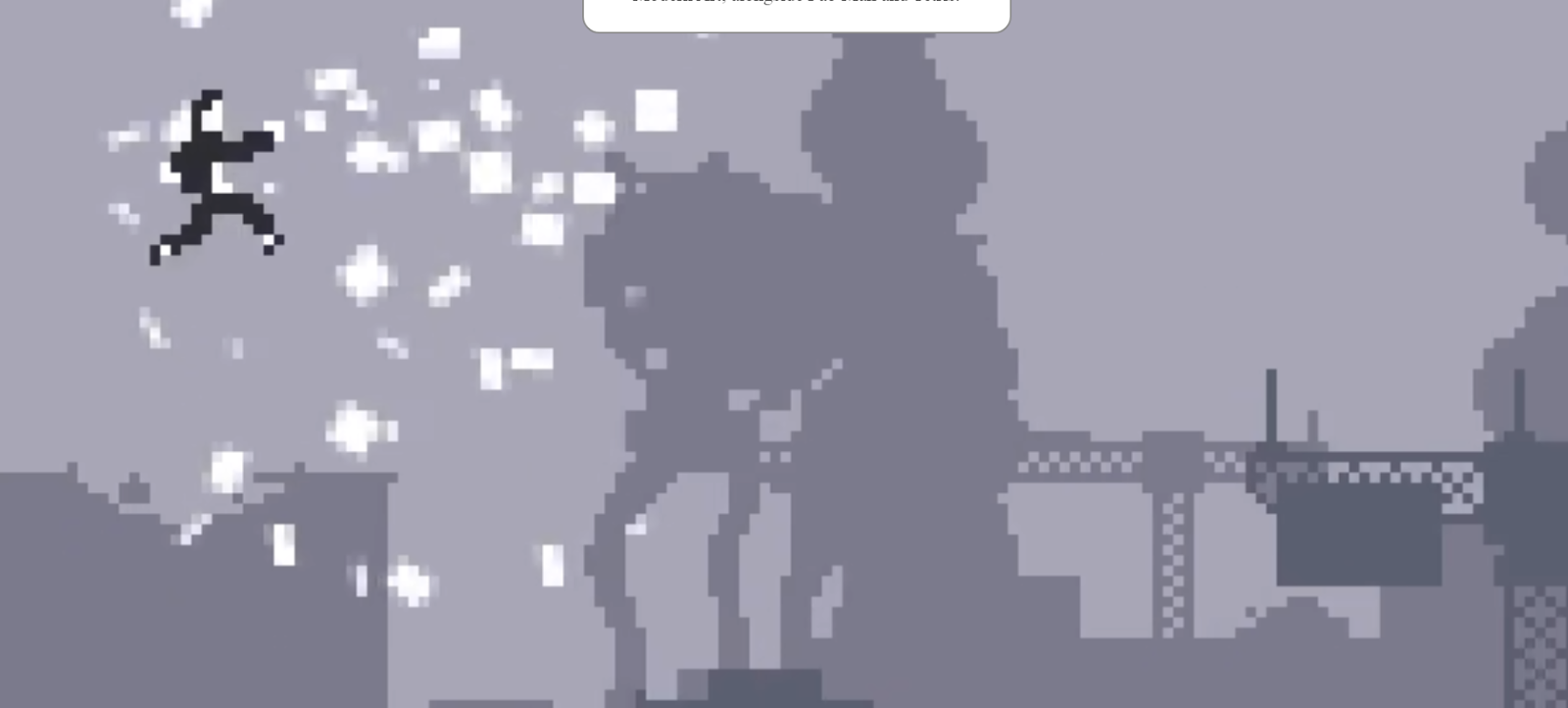
This flash game is called Canabalt . A businessman jumps out of a window and runs to escape the crumbling city. Canabalt pioneered an endless runner genre that is now one of the most popular on mobile. The game is included in the collection of the New York Museum of Modern Art along with Pac-Man and Tetris.
There were many other flash games as well. Millions. They have been played billions of times on thousands of different gaming sites. It was creative chaos.
Anything
Sites like Newgrounds allowed anyone to publish their games bypassing the studio or publisher. The developers downloaded whatever they wanted: experimental projects, artistic, violent or fun games, and even activist games. It was the Wild West of the game, and there was tremendous creativity coming from that environment.
People only created games because they wanted to create games, not for profit.
Flash workflow
The Flash workflow was designed with a focus on art, animation and coding. People who otherwise would never have written code started gradually turning their animations into games. A great example is Xiao Xiao, which started out as simple animation of figures and turned into a fighting game. Xiao Xiao No.4 was played 10 million times on Newgrounds in its release.
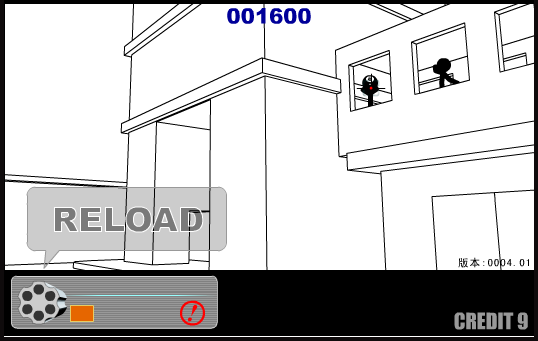
3D Shooter Xiao Xiao No.4 (2001)
Developers didn't even have to worry about the technical details of cross-platform support. A game written in Flash 20 years ago can still be played today, while games written for iOS or Android require regular updates to work correctly on new phones.
Anyone could play flash games just by clicking on the link. Today, playing and sharing games is still not as easy as it was 20 years ago.
Decentralization
Fancy Pants Adventures has been played over four million times on Newgrounds, but has been played over 300 million times on all sites where it was posted or copied!
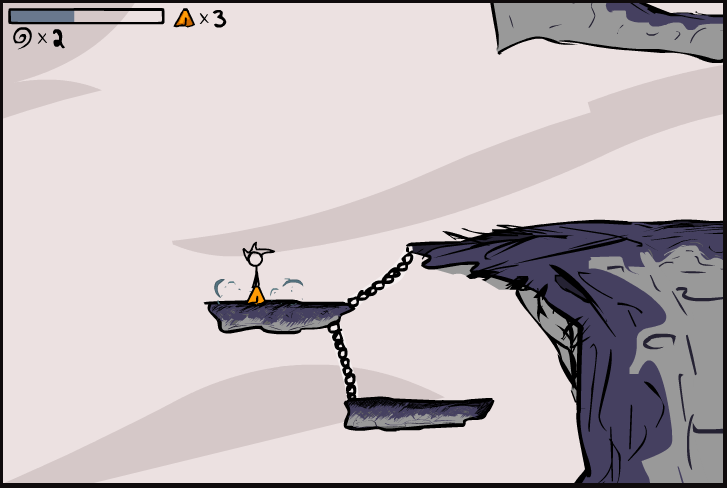
Most of the popular Flash games have been hosted on thousands of different websites at once. If the game did not find contact with the audience of one site, it could gain popularity on other sites. At that time, the internet was a more decentralized place. Games like McDonald's these days, where you corrupt politicians and destroy rainforests to cook fast food, are likely to be banned from the App Store, leaving them unlocked by a large number of players.
Short iterations
The culture of flash games promoted original ideas and forgave failure. Most games were created in a matter of months, and some in general in a few days. If something didn't work out for you, you could just make another game. Therefore, game design developed at a rapid pace.
The beginning of the end of Flash
In 2010, two years after the iPhone was released, Steve Jobs wrote an open letter explaining why Flash was not allowed on Apple's mobile platforms. Flash had security issues, drained its battery quickly, and was designed for desktops rather than touch-enabled mobile devices.
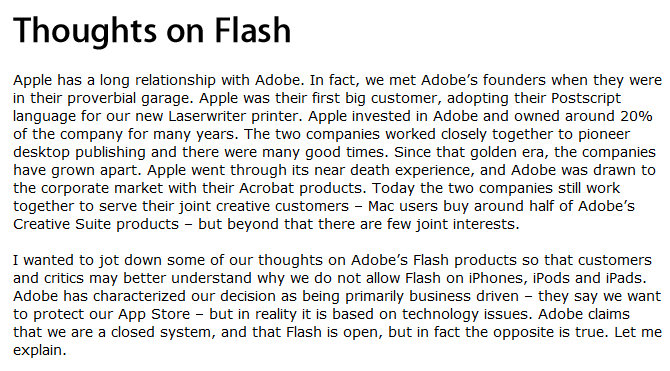
Full version of the letter
Mass exodus
By 2012, the number of players on Flash game websites had dropped, with fewer and fewer games being created in Flash. Many developers left the sinking ship to create mobile or console games, and former Flash game animators opened Youtube channels.
But the rise in popularity of the iPhone wasn't the only reason for Flash's decline. Ultimately, the internet became another place that had to support a large number of different devices.
Every technology comes to an end sooner or later. For Flash, it will come on December 31, 2020, when Adobe will officially end support and remove the relevant section from its website.
Flash's heyday lasted over 20 years. For internet technology, this is an eternity.
Memories of the developers
Jonathan Gay, Creator of Flash:
“It was great to be the creator and manager of Flash as a platform. I felt like we were reinventing a kind of pencil, because it was the creator community that was responsible for developing Flash as a creative tool. Our job was to anticipate needs, listen, and make sure it all worked.
The idea of an accessible platform for creating interactive media content that works across devices is still valid. Just as pencil and paper are relevant. I hope I can still participate in the development of something similar.
Many years ago I had an idea for a Flash Forever project - how should we feel about what is created in Flash? How about valuable information, like a book? Unfortunately, the need to drive business growth by adding features and capabilities outweighed the need to preserve the past. It's great that Flash still lives on in the skills and experiences of the community of people who learned and grew with it. "
Charlie Jackson, co-founder of FutureWave Software (Flash developer):
“Over the years, my companies have created several software tools, but Flash has proven to be the most significant. The best part was that the flash animators thanked me for making a career for them. Not just a tool, but a career. But the person who really should be thanked is Jonathan Gay, the visionary who stood behind Flash from day one until Adobe acquired it. Jonathan is an amazing person and I was fortunate enough to work with him when he was 17 and in high school. "
Tom Fulp, founder of Newgrounds:
“Flash was the first program to bring art and code together in the way I've always dreamed of. In addition, everything you created could be instantly reproduced on any computer via the Internet.
It was a magical time of experimentation, so we shied away from working with friends found on the Internet. The moment turned out to be especially good for newcomers and people from related fields, who were now able to enter the industry due to the low threshold and lack of centralized control. Newgrounds strives to maintain the spirit of that time to this day: the resource remains a place where people without experience can learn, create and share wonderful things together.
Frank Valzano, Creator of Bowman and FreeWorldGroup.com:
“Flash made the online gaming industry go up the hill, grow, and then literally explode. We played a small part in this process, but it was a huge part of my life. I've seen our games played about three billion times, and some, including Bowman, have been played hundreds of millions of times. With great sadness, I watch Flash die. Flash games made me and my business, they changed my life. They allowed me to connect with the world and feel less alone. "
Sarah Northway, creator of Rebuild:
“As a developer, I owe my success to Flash. My husband's Rebuild and Fantastic Contraption series began as flash games that millions of people played for free in their browsers.
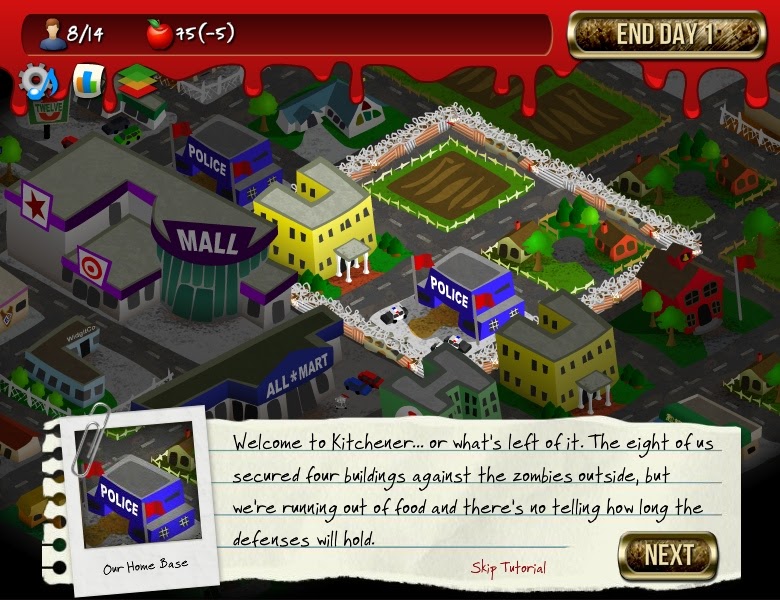
Rebuild 2 The
ease with which they were distributed was revolutionary: the world went from buying games at the mall to simply clicking a link! Flash instantly gave an audience to all these little experimental games. And also started indie projects, including my own game. "
Eli Piilonen, creator of The Company of Myself:
“The world of Flash was an incredible place to learn game development: it was a lively and fun community where content was free to access, but developers could still get paid for just about any project through sponsorship (frankly, insane), which eventually became for us distribution and marketing. All this turned into a flurry of strange and unrestrained experiments in all directions. I didn't realize it until it was over. In fact, it was a technical bubble for mass creativity! "
Paolo Pedercini, creator of The McDonald's Videogame:
“I do visual arts and design, so Flash was the perfect tool for me to create games. It allowed me to start with simple animations and gradually add more complex game mechanics, release after release.
I am still missing his timeline based logic, his IDE, and clear vector rendering. Streamlined workflows and a huge Flash ecosystem meant that I could, with another idea, create a game in a matter of days and immediately make it available to a multi-million dollar audience. The tools are constantly changing, but some types of Flash games are nearly impossible to create with other technologies, and the turbulent, fast and dirty world of online games has only been partially replaced by platforms such as itch.io. ”
Daniel Benmergui, creator of I Wish I Were the Moon:
“Flash as a platform gave anyone an accessible tool to create games, but that was not the most important aspect. The most important thing was the wide coverage.
, , Kongregate, .
The combination of "work in the browser + access to the player community" caught the attention of a newcomer, an unknown South American developer, and allowed me to pursue a career in game development. It was sad that Flash ended up in the hands of Adobe, which didn't know what to do with it and let it wither away. HTML5 still doesn't replace Flash because it lacks tools. When Flash dies, it will be a disaster. "
Jameson Hsu, co-founder of Mochi Media:
“Bob and I started making Flash games in early 2001. Making them was as much fun as it was playing. However, we all knew that the dark side of Flash games is that pirated copies of them are bound to appear on many sites. And we saw this with our own eyes when in 2005 we developed the concepts of MochiBot and MochiAds (monitoring and advertising for flash games - approx. editor ). So, by the way, Mochi Media was born.
Our close collaboration with the flash gaming community gave us inspiration. We saw how these games can change the lives of people around the world. I've built lifelong friendships in the community and I miss that camaraderie in the forums. "
Kris Antoni, Creator of Infectonator:
“In 2010, many new indie studios were springing up all over Indonesia. Flash games and their sponsored business model were the main driving factors. They opened doors for Indonesians to make money from web games.
At that time, there were no major studios or schools with game development courses in Indonesia at all, even now access to knowledge in game development is still very limited. To make matters worse, gaming is still considered a "bad" career in the eyes of parents, teachers and government officials.
The most remarkable thing about developing flash games was that you didn't need a lot of start-up capital, and you could make good money on them.
By comparison, a simple flash game that one developer worked on for less than a month could bring in anywhere from $ 500 to $ 1,000 in sponsorship and advertising, while the standard salary for a university graduate in Jakarta was around Rs 3,000,000 a month ( $ 200 in today's currency).
A better quality flash game could bring in $ 20K.
During that era, Indonesian developers released many famous games and hits such as the Epic War series from Artlogic games, the Infectonator and Necronator series from Toge Productions, Valthirian Arc from Agate and many more. These games have been played by millions of people around the world and their success has fueled the growth of the Indonesian gaming industry. ”
Jakrin Juangbhanich, creator of Sonny:
“I got into Flash after watching some badly animated parody Counter Strike cartoons on Newgrounds. It was so exciting, but at the same time so artisanal that it inspired me to download the program and experiment with it myself. Since then, it has turned into a cycle: from looking for inspiration on the portal, working on my own materials, pleading for help on the forums and submitting my own work to the portal.
All of this had a huge impact on my career. Basically, I learned how to program and create digital art. In the past few years, I have stopped working on games. I spent some time doing research in visual machine learning, and now I'm a software engineer at AWS, but I still value game development. It's a lot of fun and rewarding work. "
Ben Latimore, creator of Flashpoint (web game preservation project):
“We can preserve the memory of games, animation and the effort that went into creating content based on this technology. I've been working on this for over two years. But what about the microcosm of active creativity, readily available software, noticeable but not destructive limitations, almost universal compatibility across the entire technological space of its time, widespread adoption by encouraging free consumption in an era when "viral spread" really meant something ? We will never be able to recreate this, but we will remember. And all this was controlled by a group of guys who sat in their bedrooms and played too much Xiao Xiao. Flash was not just a large-scale platform for games, it was a miniature model of our industry - talent, drive, creativity. And I am very glad to have witnessed this.There will never be anything like this again. "
The games mentioned in this article are just a small part of the Flash era that has shaped a generation of developers. Flash gave people the ability to communicate with the whole world. If you are one of the people who create technologies and platforms today, please don't forget the lessons that Flash has given us.